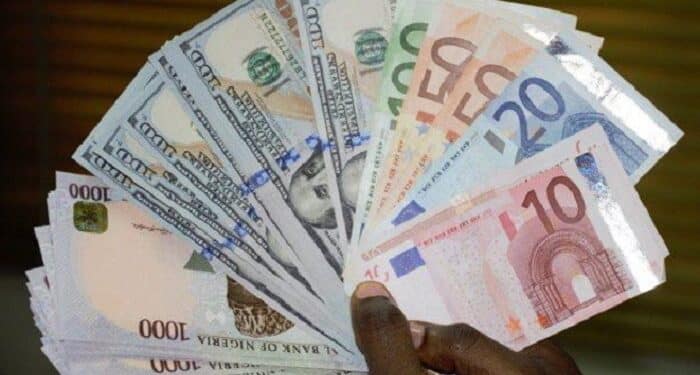Nigerians are becoming more worried as the dollar hits N1,533.99 on Thursday in the official market, despite the Central Bank of Nigeria (CBN)’s intervention. The over N1,600/$1 mark observed in March 2024, notwithstanding the currency’s appreciation in April of the same year, is recalled by this rise.
The Central Bank of Nigeria intervened to the tune of $80 million to $100 million, according to Samir Gadio, head of Africa strategy at Standard Chartered Bank. This helped liquidity in the foreign exchange market more than double to $289 million on Wednesday. The central also sold dollars on Monday.
The naira weakened 5.1%, the weakest level against the dollar since March 20, according to the FMDQ Securities Currency Limited’s summary of foreign currency (FX) trade, the naira fell by 4.89 per cent on Thursday, with the dollar quoted at N1,533.99, compared to N1,459.02 on Wednesday at the Nigerian Autonomous Foreign Exchange Market (NAFEM).
The dollar supplied by willing sellers and willing buyers fell 5.63 per cent to $272.86 million on Thursday from $289.14 million reported on Wednesday, which coincided with the depreciation of the naira due to a scarcity of US currency.
The dollar was quoted at N1,590 on Thursday during intraday trading, slightly higher than the N1,593 quote on Wednesday. The same day’s intraday low closed at N1,399.20, which was likewise somewhat better than Wednesday’s closing price of N1,401/$1.
The Naira lost N15/$1 and declined to N1,535 on Thursday at the parallel market, popularly referred to as the black market, from N1,520 on Wednesday.
In some locations used for street dealing, the dollar was valued at N1,545.
On social media, many Nigerians have voiced their worries over the naira’s decline in value. “What’s next with APC after Binance bans 1 USD today is 1,545 Naira?” inquired one of the X users. who is damaging the naira by speculating?
Another X member commented, “1 USD is 1,545 Naira today. We must prepare for days to come as the dollar keep rising fast against Naira.”
14 new international money transfer operators (IMTOs) have received approval in principle (AIP) from the Central Bank of Nigeria (CBN) in an effort to improve cross-border fund transfer services and support foreign currency remittance flows. This activity is a component of the CBN’s initiatives to advance financial inclusion and raise the effectiveness of remittance transactions inside the nation.
When it comes to enabling the transfer of money from foreign persons and organisations to beneficiaries in Nigeria, IMTOs are essential. The approval in theory denotes a conditional acceptance of these operators’ plans, subject to the satisfaction of other conditions for final approval.
At a press event on Wednesday in Abuja, Hakama Sidi Ali, the CBN’s acting head of corporate communications, emphasised the importance of this choice. According to Ali, by encouraging more competition and innovation among IMTOs, the permission will help diversify the foreign exchange market.
“This initiative aims to lower the cost of remittance transactions and promote financial inclusion by expanding access to formal channels for fund transfers,” stated Ali. “By granting approval to these IMTOs, we anticipate an increase in the sustained supply of foreign exchange in the official market, which will ultimately benefit the Nigerian economy.”
Ali highlighted that the permission is in line with the CBN’s overarching plan to double the amount of foreign exchange remittances sent through official channels. The influx of funds through these channels is expected to bolster liquidity in Nigeria’s Autonomous Foreign Exchange Market (NAFEX) and facilitate price discovery mechanisms to achieve a market-driven fair value for the naira.










